
Substance Abuse Treatment Prevention and Policy
Scope & Guideline
Leading the charge in substance abuse treatment and prevention.
Introduction
Aims and Scopes
- Substance Use Disorder Treatment:
Research on various treatment modalities for substance use disorders, including medication-assisted treatment, behavioral therapies, and integrated care models. - Harm Reduction Strategies:
Exploration of harm reduction approaches, such as syringe exchange programs and supervised consumption sites, aimed at reducing the negative consequences of drug use. - Public Health Policy and Advocacy:
Analysis of substance use policies, their implications, and public attitudes towards these policies, providing insights for stakeholders. - Social Determinants of Substance Use:
Investigation of how socioeconomic factors, cultural contexts, and demographic characteristics influence substance use patterns and treatment engagement. - Innovative Research Methodologies:
Use of diverse research methodologies, including qualitative studies, mixed-methods research, and prospective cohort studies, to address complex issues in substance use. - Youth and Substance Use:
Focus on adolescent and young adult substance use, highlighting trends, prevention strategies, and treatment needs for this population.
Trending and Emerging
- Impact of COVID-19 on Substance Use:
A significant increase in research addressing the effects of the COVID-19 pandemic on substance use patterns, treatment access, and public health responses. - Digital Interventions and Telehealth:
Emerging focus on technology-based interventions for substance use disorders, including telehealth services and digital health applications, reflecting a shift towards more accessible treatment options. - Polysubstance Use Trends:
Growing interest in the patterns and implications of polysubstance use, particularly in the context of the opioid crisis and emerging drug trends. - Community-Based Approaches:
A rising trend towards community-based interventions and the role of grassroots organizations in addressing substance use, emphasizing collaboration and local engagement. - Mental Health and Substance Use Correlation:
Increased exploration of the relationship between mental health disorders and substance use, highlighting the need for integrated treatment approaches.
Declining or Waning
- Traditional Substance Use Prevention Programs:
There appears to be a waning emphasis on traditional prevention programs that focus solely on abstinence-based approaches, as newer harm reduction strategies gain prominence. - Alcohol Use Disorder Studies in Non-Western Contexts:
Research specifically targeting alcohol use disorders in non-Western contexts has become less frequent, possibly due to a shift towards more global perspectives on substance use. - Single-Substance Studies:
There is a noticeable reduction in studies focusing exclusively on single substances, such as alcohol or opioids, as the complexities of polysubstance use become more recognized.
Similar Journals
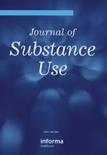
Journal of Substance Use
Exploring the complexities of addiction and intervention.The Journal of Substance Use is a vital resource for researchers, professionals, and students in the fields of health and social sciences, published by Taylor & Francis Inc.. With an ISSN of 1465-9891 and E-ISSN of 1475-9942, this journal has been at the forefront of substance use research since its inception in 1996 and continues to provide a platform for the dissemination of innovative findings and critical analysis up to the year 2024. Ranking in the Q3 category for both Health (Social Science) and Medicine (Miscellaneous) in the 2023 quartiles, the journal encapsulates a broad spectrum of issues related to substance use, including addiction, intervention strategies, and policy implications. Although not an open-access journal, it remains accessible to a wide audience. With its substantial role in enhancing understanding and addressing the multi-faceted challenges of substance use, the Journal of Substance Use is essential for all stakeholders aiming to contribute to research and practice in this crucial area.
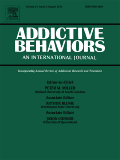
ADDICTIVE BEHAVIORS
Unraveling the Complexities of AddictionADDICTIVE BEHAVIORS is a prestigious journal published by PERGAMON-ELSEVIER SCIENCE LTD, specializing in the critical examination and exploration of addiction-related issues across diverse fields including Clinical Psychology, Psychiatry and Mental Health, and Toxicology. With a robust history dating back to 1975 and convergence extending to 2024, the journal is esteemed for its rigorous peer-reviewed research that contributes significantly to understanding addiction phenomena. Ranked in the Q1 category for its focus areas, it stands out within the academic community, evidenced by its impressive Scopus rankings—25th in Clinical Psychology and 14th in Toxicology—placing it in the top tier of its disciplines. This journal offers valuable insights into addiction behaviors, treatment methodologies, and public health implications, making it an essential resource for researchers, practitioners, and students seeking to advance their knowledge and impact the field. Although not Open Access, it provides vital access options for institutions and individuals invested in addiction studies.
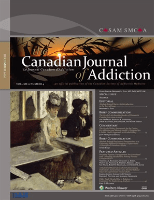
Canadian Journal of Addiction
Transforming addiction research into actionable knowledge.Canadian Journal of Addiction is a leading platform dedicated to advancing the understanding of addiction and its multifaceted impacts on individuals and society. Published by LIPPINCOTT WILLIAMS & WILKINS, this journal aims to foster rigorous research and discussion in the field of addiction studies, contributing significantly to the intersection of psychiatry and mental health. With its ISSN 2368-4720 and E-ISSN 2368-4739, the journal is indexed in Scopus and has been categorized in the Q3 quartile for 2023, reflecting its emerging influence amongst peers. The Canadian Journal of Addiction facilitates a vital exchange of ideas and findings, crucial for researchers, practitioners, and students alike, addressing pressing issues related to addiction through innovative studies and insightful reviews. Subscribers and readers benefit from the latest findings as they navigate through the dynamic landscape of addiction research, enriching both academic knowledge and practical applications.
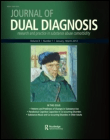
Journal of Dual Diagnosis
Unraveling the intricacies of dual diagnosis.The Journal of Dual Diagnosis, published by Routledge Journals, Taylor & Francis Ltd, is a leading interdisciplinary platform dedicated to the critical study of co-occurring mental health and substance use disorders. With its ISSN 1550-4263 and E-ISSN 1550-4271, this esteemed journal has been at the forefront of advancing research and clinical practice since its inception in 2004, and continues to serve as a vital resource until 2024. Ranked in the second quartile (Q2) in Psychiatry and Mental Health and positioned at the 64th percentile in the Scopus rankings, it emphasizes the importance of integrating care across various domains of health. Although not open access, it offers a wealth of peer-reviewed articles, case studies, and reviews suitable for researchers, practitioners, and students alike, aiming to enhance our understanding and treatment of dual diagnosis. The journal's commitment to addressing the complexities of dual disorders not only informs research but also shapes policy and clinical guidelines, making it an essential read for anyone involved in these critical areas of mental health.
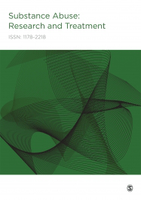
Substance Abuse-Research and Treatment
Innovating treatment approaches for substance-related disorders.Substance Abuse: Research and Treatment is a premier open-access journal published by SAGE Publications Ltd, focusing on the multifaceted aspects of substance use and its impact on mental health. Since its establishment in 2008, this journal has been dedicated to disseminating innovative research findings, case studies, and reviews that enhance understanding and treatment of substance-related disorders. With an impact factor that reflects its standing in the field, currently ranked in the Q2 category of Psychiatry and Mental Health, Substance Abuse: Research and Treatment strives to foster interdisciplinary dialogue among researchers, practitioners, and students. By making its content freely accessible, the journal encourages widespread engagement and application of evidence-based practices to mitigate substance abuse issues. The journal’s diverse global perspectives make it a vital resource for anyone invested in advancing knowledge and improving treatment outcomes in this critical area of public health.

Addiction Science & Clinical Practice
Advancing understanding, enhancing clinical practice.Addiction Science & Clinical Practice is a premier open-access journal dedicated to advancing the understanding and treatment of addiction through evidence-based research and clinical practice. Published by BMC in the United Kingdom since 2007, this journal has significantly impacted the fields of Clinical Psychology, Medicine, and Psychiatry and Mental Health, proudly securing a Q1 ranking in multiple categories as of 2023. With an emphasis on high-quality research, the journal provides an inclusive platform for the dissemination of innovative findings and clinical insights that address the complexities of addiction. Researchers, practitioners, and students alike benefit from its unrestricted access since 2012, allowing for widespread dissemination of knowledge. Located at CAMPUS, 4 CRINAN ST, LONDON N1 9XW, the journal continues to lead the way in fostering collaboration and informing best practices in addiction science.
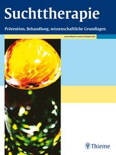
Suchttherapie
Enhancing Understanding of Addiction and RecoverySuchttherapie, an esteemed journal published by GEORG THIEME VERLAG KG, serves as a critical platform within the fields of Applied Psychology and Psychiatry and Mental Health. Established in 2000 and continuing through 2024, this journal is committed to advancing the understanding and treatment of addiction and related psychological issues. Although it currently stands in the Q4 Quartile ranking and is categorized as low percentile in both Scopus Ranks and impact metrics, its significance lies in its dedication to disseminating cutting-edge research and clinical findings that contribute to the evolving landscape of therapeutic practices. Published in Germany, the journal facilitates unlimited access to the vital discourse surrounding mental health and addiction treatment, making it a valuable resource for researchers, professionals, and students alike seeking to enhance their knowledge and skills in this important area of study. As the field continues to grow, Suchttherapie plays a pivotal role in bridging practice with academic rigor, ensuring that readers remain informed on the latest methodologies and insights.
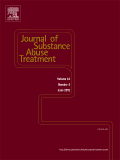
JOURNAL OF SUBSTANCE ABUSE TREATMENT
Leading the Charge in Substance Abuse ResearchJOURNAL OF SUBSTANCE ABUSE TREATMENT, published by Pergamon-Elsevier Science Ltd, is a leading peer-reviewed journal that spans a wide range of topics related to substance abuse and addiction treatments. With an impressive impact factor, this esteemed journal ranks in the Q1 quartile across multiple disciplines including Clinical Psychology, Medicine (miscellaneous), and Psychiatry and Mental Health, making it a vital resource for researchers and practitioners alike. Covering convergence years from 1984 to 2023, it publishes cutting-edge research that informs treatment methodologies and policy development in the field of substance abuse. With access options that adapt to both traditional and modern academic needs, the journal seeks to advance the understanding and effectiveness of substance abuse treatment through comprehensive studies and innovative approaches. Be part of a global dialogue that shapes the future of addiction treatment by engaging with the latest findings and expert analyses that help bridge the gap between research and clinical practice.
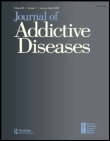
JOURNAL OF ADDICTIVE DISEASES
Exploring the Frontiers of Addiction ScienceJOURNAL OF ADDICTIVE DISEASES, published by ROUTLEDGE JOURNALS, TAYLOR & FRANCIS LTD, serves as a pivotal platform for researchers, clinicians, and students in the realms of clinical psychology, psychiatry, and addiction studies. With a distinguished history dating back to its inception in 1991, this journal spans critical research developments with its current scope covering converged years from 2018 to 2024, ensuring a robust repository of knowledge. Notably, it holds a respectable impact factor and is categorized in Q2 quartiles across several disciplines including Clinical Psychology, Medicine (miscellaneous), and Psychiatry and Mental Health for 2023, reflecting its impactful contributions to the scientific community. Despite the journal not currently offering Open Access, it remains highly ranked, occupying positions in the top percentiles of Scopus rankings. This journal emphasizes the importance of disseminating high-quality research focused on addictive behaviors and diseases, thereby addressing vital clinical and public health challenges.
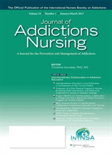
Journal of Addictions Nursing
Advancing Addiction Care Through Nursing ExcellenceThe Journal of Addictions Nursing, published by Lippincott Williams & Wilkins, serves as a pivotal resource in the field of psychiatric and mental health nursing. With an ISSN of 1088-4602 and an E-ISSN of 1548-7148, this esteemed journal has been dedicated to advancing the knowledge and practice of addiction nursing since its inception in 1989. As of 2023, it ranks in the Q3 category of psychiatry and mental health, highlighting its significance amidst its peers. The journal provides a platform for the dissemination of original research, reviews, and clinical practices that address the complexities of addiction treatment and care. While it currently does not offer open access options, its valuable insights are accessible to practitioners and researchers committed to improving patient outcomes. With content spanning from 1989 to 2024, the journal continues to shape the discourse in this vital area of nursing, making it an essential read for professionals and scholars aiming to stay at the forefront of addiction nursing and intervention strategies.